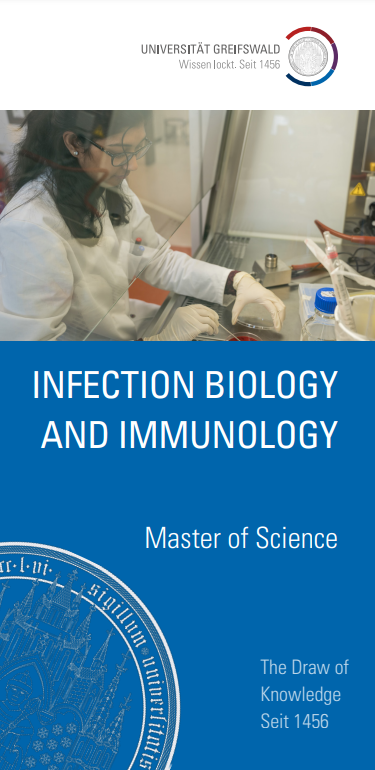Students Require the Following Skills
The master’s degree course ‘Infection Biology and Immunology’ is aimed at graduates of bachelor’s degree courses in areas such as biology, biochemistry, human biology or degree courses with similar contents. The students should have sound knowledge of biological disciplines such as biology, biotechnology, biochemistry and molecular medicine.
Language Skills
- Proven proficiency in English at a level of at least B2 of the ‘Common European Framework of Reference for Languages’
- Alternatively, proof of at least seven years of English at school
- Furthermore, proven proficiency in Germany at a level of at least B2
Degree Course ‘Infection Biology and Immunology’
The master‘s degree course aims to educate graduates so that they can independently identify and structure questions in research and/ or practice and answer them by selecting and applying suitable scientific methods. These goals are achieved through researchoriented training with significant practical components.
After commencing studies in winter semester, students first gain basic knowledge of infection biology and immunology and are introduced to OMICs technologies and Data Science. These modules are complemented by key competences such as bioethics and laboratory animal science.
Based on this foundation, students have a free choice of advanced modules and are able to specialise in areas that reflect their strengths and that they are interested in. During their studies, students receive an extensive/multifaceted methodological education that includes advanced biomedical laboratory methods in infection biology, immunology and modern OMICs technology, as well as clinical research. Students learn how to use their knowledge to solve problems and to critically reflect and analyse complex matters. By attending these courses, students acquire practical and theoretical competences and are able to transfer principles of infection biology, immunology and biomedicine to specific problems.
Career Opportunities
By focusing on scientific theory and practice and fostering independence and solution-oriented thinking, graduates receive the best possible preparation for careers at scientific and industrial institutions. Having gained the degree of Master of Science, graduates have access to managerial positions on the international job market or also in the public service sector. Jobs can be found at higher education institutions, research institutions, authorities and in the industrial sector, for example, in the pharmaceutical industry, at clinical laboratories or in medical technology. Furthermore, graduates are able to commence a doctorate and thus pursue a scientific career in research inside or outside of higher education.
The Research Location
Projects in the field of infection biology and immunology, including clinical and patient-oriented questions, constitute a key field of research at the University and University Medicine Greifswald. The combination of university facilities and external research institutions such as the Friedrich-Loeffler-Institut – Federal Research Institute for Animal Health – and the Helmholtz Institute for One Health (founded in 2022), provides Greifswald with an infrastructure unique to Germany in the field of infection biology and immunology of humans and animals in viral, bacterial or parasitic infections. The excellent infrastructure provided by the research institutions with laboratories up to biosafety level 3 and 4, as well as state-of-the-art technological equipment in the field of proteogenomics and high resolution microscopy enable teaching and research at a high and internationally competitive level.
email: infection.biologyuni-greifswaldde
Academic advisor:
Dr. Thomas Kohler
Tel.: +49 3834 420 5713
Head of examination board:
Prof. Dr. Sven Hammerschmidt
Tel.: +49 3834 420 5700


